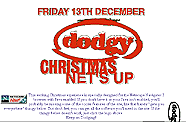 
|
 
|
 
|
 
|
 
|
  |
The gung-ho approach
'The music industry was one of the first in 1995 to say en masse that we needed to get on the Internet,' explains Nicolson. 'It was driven by the artists rather than the accountants and it became a very fashionable thing to do in 1995. However, people then discovered that an Internet site was a lot of work. You had to give people a reason to come back and there was a sudden realisation that, having spent lots to set it up, it would cost even more to maintain. In the middle of 1995, the music industry interest levelled off and a lot of the gung-ho went out of the process.'

|
|
Dodgy's Christmas party - the grand-daddy of them all |
'We'd looked at the existing Webcasts, which had been successful up to a point,' says Sam King of Net design company Palace of Vision, which set up the Dodgy Xmas Nets Up event. 'But there had been no event yet which showed the difference between the Internet and radio. We wanted to move the concept of Internet broadcasting to the next level.' The site was created with a message port and video, and the Brixton party became an interactive online event.
The move to improve content on sites is triggering the biggest change so far. 'Events such as this represent the way the Net is heading. It's no longer acceptable just to put up pages with a few links and hope that someone comes - you've got to have function and content,' says King.
Few sites are truly commercial. Most are used for relationship marketing and the commercial benefits appear elsewhere. 'Bands' sites will continue to develop the relationship with fans rather than offer their latest music,' says King. 'By this time next year you will be able to buy any kind of music direct to your home. Record companies want it to be like CD but it isn't - it will be a parallel medium where people choose to buy instead of rather than as well as. However, until the Internet can deliver CD quality, no-one will pay a penny and it will have to be used as a marketing tool.'